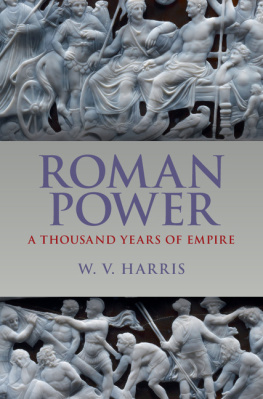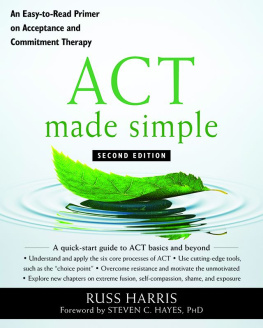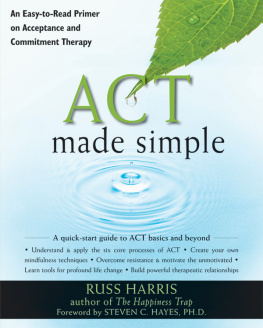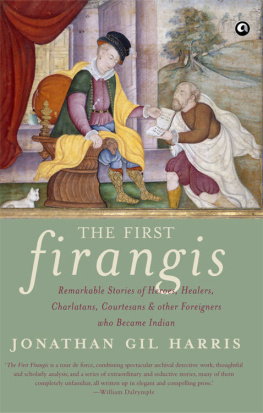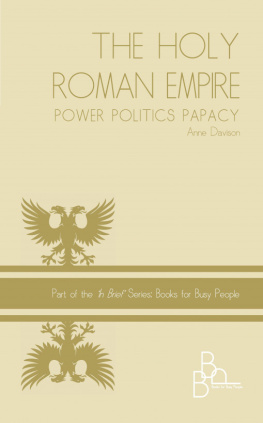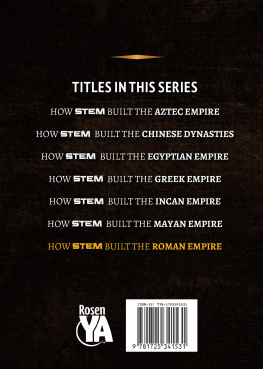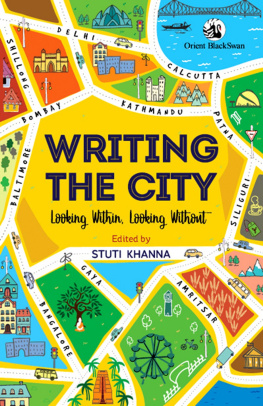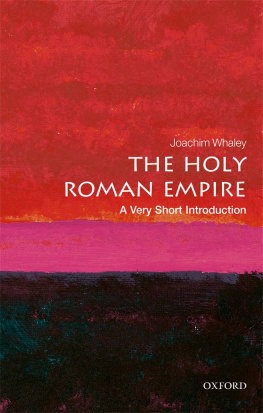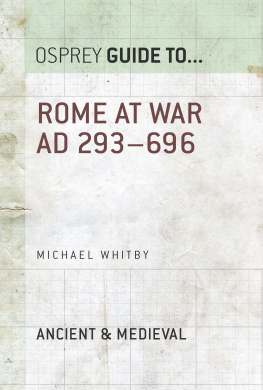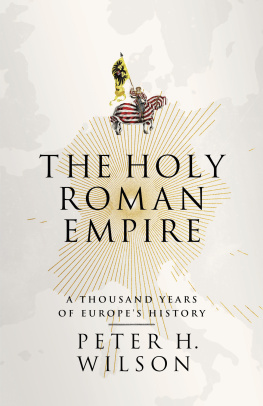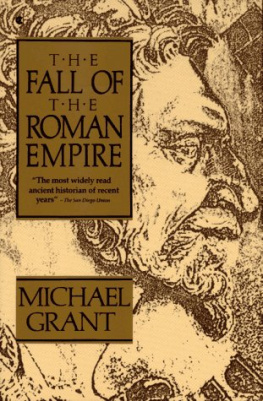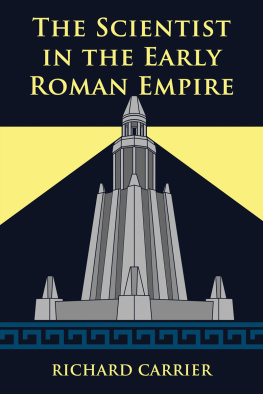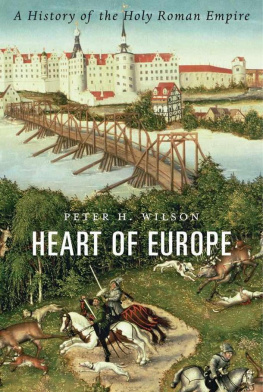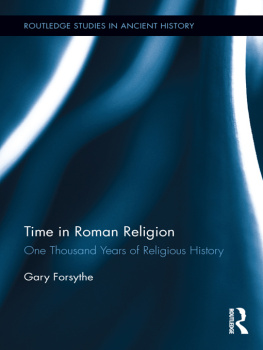Harris - Roman Power : A Thousand Years of Empire
Here you can read online Harris - Roman Power : A Thousand Years of Empire full text of the book (entire story) in english for free. Download pdf and epub, get meaning, cover and reviews about this ebook. year: 2016, publisher: Cambridge Univ Pr, genre: Politics. Description of the work, (preface) as well as reviews are available. Best literature library LitArk.com created for fans of good reading and offers a wide selection of genres:
Romance novel
Science fiction
Adventure
Detective
Science
History
Home and family
Prose
Art
Politics
Computer
Non-fiction
Religion
Business
Children
Humor
Choose a favorite category and find really read worthwhile books. Enjoy immersion in the world of imagination, feel the emotions of the characters or learn something new for yourself, make an fascinating discovery.
Roman Power : A Thousand Years of Empire: summary, description and annotation
We offer to read an annotation, description, summary or preface (depends on what the author of the book "Roman Power : A Thousand Years of Empire" wrote himself). If you haven't found the necessary information about the book — write in the comments, we will try to find it.
Harris: author's other books
Who wrote Roman Power : A Thousand Years of Empire? Find out the surname, the name of the author of the book and a list of all author's works by series.
Roman Power : A Thousand Years of Empire — read online for free the complete book (whole text) full work
Below is the text of the book, divided by pages. System saving the place of the last page read, allows you to conveniently read the book "Roman Power : A Thousand Years of Empire" online for free, without having to search again every time where you left off. Put a bookmark, and you can go to the page where you finished reading at any time.
Font size:
Interval:
Bookmark:

Roman Power: A Thousand Years of Empire
The Roman Empire was one of the largest and most enduring in world history. In his new book, distinguished historian William Harris sets out to explain, within an eclectic theoretical framework, the waxing and eventual waning of Roman imperial power, together with the Roman communitys internal power structures (political power, social power, gender power, economic power). Effectively integrating analysis with a compelling narrative, he traces this linkage between the external and the internal through three very long periods, and part of the originality of the book is that it almost uniquely considers both the gradual rise of the Roman Empire and its demise as an empire in the fifth and seventh centuries ad . Professor Harris contends that comparing the Romans of these diverse periods sharply illuminates both the growth and the shrinkage of Roman power as well as the empires extraordinary durability.
The pupil of extraordinary Oxford teachers, W. V. Harris counts himself fortunate to have escaped at the age of twenty-six to the hyper-stimulating environments of New York City and the Columbia University History Department. The author of War and Imperialism in Republican Rome , Ancient Literacy , Restraining Rage: the Ideology of Anger Control in Classical Antiquity (which won the Breasted Prize of the American Historical Association), Dreams and Experience in Classical Antiquity , and Romes Imperial Economy , he has also edited books about ancient money, the ancient Mediterranean, and the spread of Christianity, among other subjects. Among other honours, he is a Fellow of the American Academy of Arts and Sciences and a Corresponding Fellow of the British Academy.
Roman Power
A Thousand Years of Empire
W. V. Harris


University Printing House, Cambridge CB2 8BS, United Kingdom
Cambridge University Press is part of the University of Cambridge.
It furthers the Universitys mission by disseminating knowledge in the pursuit of education, learning, and research at the highest international levels of excellence.
www.cambridge.org
Information on this title: www.cambridge.org/9781107152717
William V. Harris 2016
This publication is in copyright. Subject to statutory exception and to the provisions of relevant collective licensing agreements, no reproduction of any part may take place without the written permission of Cambridge University Press.
First published 2016
Printed in the United Kingdom by TJ International Ltd Padstow Cornwall
A catalogue record for this publication is available from the British Library.
Library of Congress Cataloging-in-Publication Data
Names: Harris, William V. (William Vernon), author.
Title: Roman power : a thousand years of empire / W. V. Harris.
Description: New York : Cambridge University Press, 2016. | Includes bibliographical references and index.
Identifiers: LCCN 2016008143 | ISBN 9781107152717 (hardback)
Subjects: LCSH: RomeHistoryEmpire, 30 B.C.476 A.D. | RomeHistoryRepublic, 26530 B.C.
Classification: LCC DG270.H27 2016 | DDC 937dc23
LC record available at http://lccn.loc.gov/2016008143
ISBN 978-1-107-15271-7 Hardback
Cambridge University Press has no responsibility for the persistence or accuracy of URLs for external or third-party Internet Web sites referred to in this publication and does not guarantee that any content on such Web sites is, or will remain, accurate or appropriate.
for W.E.S.H., with love
I especially want this book to be accessible and useful to people who, while they want to learn about the Romans and their empire, know little about Roman history as it is now understood. With such readers in mind, I have explained technical terms and identified historical actors more than I would have done in a narrowly academic book, and I have also provided a table of dates. At the same time, the book has some moments of originality (sketched out in ) which may attract the attention of other scholars of ancient history.
As it is now understood: with that phrase I intend to say that I have attempted to take very recent as well as older scholarship into account. But alas no one can possibly claim to have read and seen everything that pertains to a thousand years of Roman history. Roughly 130 ancient writers are mentioned in this book (not counting the authors of documentary texts), and there exist texts that I have not read. Meanwhile the modern bibliography of Roman history, literature, law, and archaeology is a tropical jungle. I have attempted to take account of as much of it as possible, down to the early months of 2015.
In the interests of transparency I have referred as often as possible to the primary sources and to the vastly variegated material evidence that a Roman historian has at his or her disposal. I have also provided in the notes a basic guide to modern scholarly writing about Roman power, tending to emphasize what is recent but not shying away from older works. I have emphatically not provided full bibliographies on every controversy. And I have regretfully privileged works in English: Roman history is an international subject, and a scholar must attend carefully to literature in at least five modern languages, but one has to recognize that many anglophone students are monolingual.
The book is short in relation to its gigantic subject-matter. I have elided two aspects of this subject-matter, and the reader deserves explanations. In the first place, I have not said a great deal about the biases, motives, interests, methods, presuppositions, or general background of the men (they are virtually all men) who provide us with our textual evidence. A full discussion would have required a separate volume of a quite different character. Readers on the alert will undoubtedly notice a number of implicit evaluations.
I have also elided almost all discussion of the natural environment of the Romans and their neighbours. That is my next big project. The reader of this book will notice some references to mineral and timber resources, access to which was quite crucial to Roman power on a number of occasions. The reason why there is not more here about the natural environment is fairly simple: too much is uncertain at this date. Two examples: deforestation is hard to define, let alone assess; there was a lot of it, but the inhabitants of the Roman Empire may have managed their woodlands well enough that no major ecological or economic harm was done. I have discussed this matter elsewhere (Harris for overviews). In short, we are still some distance away from being able to relate the growth, survival, or decline of Roman power in a definite and convincing way to environmental factors.
Walter Scheidel, as I am happy to acknowledge, started me thinking systematically about this subject by inviting me to write an essay about power for the Oxford Handbook of Roman Studies . Many thanks to him for that stimulus.
This book would have taken even longer to write if it had not been for a generous award from the Andrew W. Mellon Foundation, for which I am profoundly grateful; I am especially grateful to the officer of the Foundation who was most responsible, the distinguished sociologist Harriet Zuckerman.
Font size:
Interval:
Bookmark:
Similar books «Roman Power : A Thousand Years of Empire»
Look at similar books to Roman Power : A Thousand Years of Empire. We have selected literature similar in name and meaning in the hope of providing readers with more options to find new, interesting, not yet read works.
Discussion, reviews of the book Roman Power : A Thousand Years of Empire and just readers' own opinions. Leave your comments, write what you think about the work, its meaning or the main characters. Specify what exactly you liked and what you didn't like, and why you think so.

